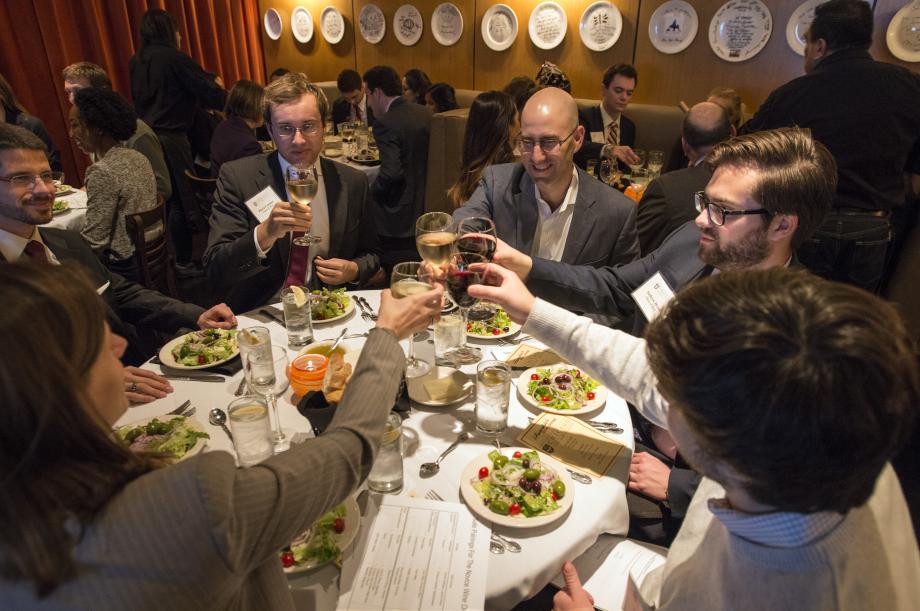Dinner Event Teaches Law School Students the Art of Etiquette

The dinner table was rife with pitfalls: bone-in chicken that was awkward to slice, olives with pits, slippery peas that sometimes tumbled from forks, one bounce away from rolling across the table. For the five dozen Law School students who were dining that evening with law firm attorneys, it could have been an etiquette nightmare.
Except it wasn’t, and the hurdles were intentional, placed strategically by the woman at the front of the room: Dr. Sharon Meit Abrahams, Foley & Lardner’s Director of Professional Development and an etiquette expert who has been teaching professionals the ins-and-outs of business decorum for more than 20 years. Abrahams had been brought in by the Law School’s Office of the Dean of Students to deliver hands-on training in a skill that some worry is too seldom taught, despite its enduring relevance in the professional world.
“Professionalism is essential in the legal workplace, and knowing the rules of business etiquette is part of that,” Dean of Students Amy M. Gardner said. “We hold events like this, and have initiatives like the Keystone Professionalism & Leadership Program, because we want our graduates to have the tools and confidence to build the relationships that will be central to their success as lawyers.”
As Abrahams guided students through the meal in a Michigan Avenue restaurant—where they were joined by attorneys from Bartlit Beck Herman Palenchar & Scott, Winston & Strawn, and Foley & Lardner—she met each of their What-do-I-do-ifs …? with a rule and some crisp advice. The olives? Place the pit discreetly on the side of your plate with your fingers. Eating peas? Scoop or pierce, your choice, just be careful. And when you’re ordering for yourself, avoid tricky and messy selections. At each table, the lawyers played the role of host and offered their own insight and advice.
“I took away a lot, and I think I’ll feel a lot more confident in these sorts of settings in the future,” said Helen Tang, ’16. “I know what the rules are now.”
In the past, children and teens often learned the rules of dining etiquette at home as they gathered for nightly dinners uninterrupted by the vagaries of the digital age—an urgent text message here, a quick social media post there—or the heightened demands of school activities and parental work/life balance. Young lawyers had opportunities to refine their skills by observing and emulating more experienced professionals. Times, however, have changed.
“People used to bring their bosses home for dinner … and women used to go to each other’s houses to play cards—that type of socializing doesn’t really exist anymore, and so young people don’t get the same role modeling,” Abrahams said. “Years ago, a lawyer would learn at the knee of another lawyer. They saw how they behaved, they saw how they treated their clients. But now nobody wants to pay for a young lawyer to go to the business meals or the presentations, so there aren’t the same opportunities to see the behavior.”
The expectations and need for proper behavior, however, still exist. A business meal moves more smoothly when everyone knows, for instance, that meal’s host should set the tone for what to order and when to begin eating, or that the outer-most utensil should be used first. Civility and comfort prevail when people know how to make an introduction, enter a new conversation, respond to an email, acknowledge a favor or gift, issue an invitation, and dress for an event. And by the way, Abrahams points out: “When etiquette fails, that’s where law steps in.”
“For instance, what is the etiquette of the four-way stop? The first person who gets there goes first, or the person on the right if two arrive at the same time, right?” she said. “But when the etiquette isn’t available because people no longer know the rules, you have to put in a traffic light.”
For law students, knowing the rules of etiquette means having an advantage in job interviews, during summer work, and in their careers after graduation.
“The vast majority of us are going to be interviewing, and we’ll be in situations where they are going to take us out to lunch or dinner or some sort of networking event as part of the interview,” Tang said. “You need to know how to behave properly to get the job.”